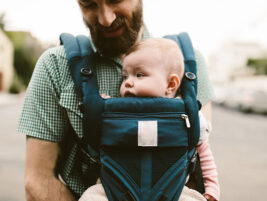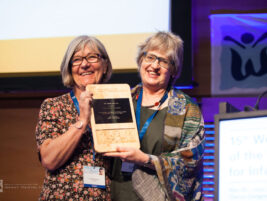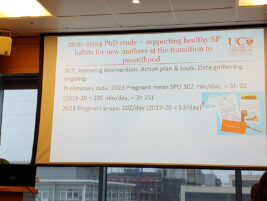Introduction
During the COVID-19 pandemic, parents around the world found themselves dealing with a variety of challenges. Parents of young children had multiple adjustments to navigate: adjusting to the unexpected lack of structure and out-of-home care for their children, planning indoor daily activities, dealing with the financial burden, threat of job loss and income, and the demand of working remotely without support and help. Moreover, the reduction of social contacts and the closure of the social-based educational, recreational, and productive activities has had a severe impact on the emotional and psychological well-being of humans (Provenzi & Tronick, 2020).
A family unit is built upon attachments and relationships. Therefore, a stressful event such as COVID-19, most likely affects the entire family. Due to their cognitive immaturity, younger children may be protected from full psychological exposure to the consequences of COVID-19. However, they may still be vulnerable to a disruption in caregiver functioning, as one of the most important resilience factors for children is their ability to attach to their caregivers (Pine et al., 2005). According to attachment theory (Davis, 2004), at an early age, the parent-child attachment process enhances the child’s sense of security in the future. Parents who are both responsive to their children and available to them in dangerous situations, help the children develop internal working models to handle similar situations in the future. The internal working models are based on the caregiver’s ability to provide comfort and safety, repair interactive mismatches, and in times of stress will guide the children’s behavior and ideas about the safety of the world (Schechter & Willheim, 2009; Tronick & Gold, 2020). Taken together, parents’ coping strategies in dire situations may have a dramatic influence on their children’s current and future well-being, rendering social support for parents of utmost importance.
While stress and anxiety are inherent to a global pandemic, lack of social support adds another layer of distress. Studies suggest that any form of positive social support is likely to buffer or reverse feelings of perceived isolation or loneliness (Rozenkrantz et al., 2020). Reassurance from other parents, as well as guidance from professionals, can provide parents with resilience during challenging times, nourish their children’s wellbeing and mental health, and repair relationships that have been disrupted (Tronick & Gold, 2020). Despite that, today, nine months after the outbreak, there are still limited options for parents of young children to connect virtually or in-person with other parents to discuss their challenges and successes as parents during the pandemic.
In this article, we will describe specific case studies of virtual support groups that were conducted during COVID-19, referred to as “Co-Relation” groups. Our hypothesis is that building relationships can be an effective intervention that overcomes the negative effects of social isolation. This assumption was also found to be true in animal and human research on emotional and cognitive well-being (Cacioppo et al., 2015; Cacioppo & Hawkley, 2009; Provenzi and Tronick, 2020). In particular, the reparation of the inevitable mismatches and miscommunications of typical interactions – their messiness – generates a sense of trust and connection to others, increases individuals’ coping capacity, and engenders a sense of safety and hope (Tronick, 2006; Tronick & Gold, 2020).
Our focus in this article is on ways that parents and young children can cope with the new reality of isolation, crisis, and uncertainty via support groups. We describe changes to their relationships in the context of personal and environmental change. Finally, we reflect on the theory that the reparation of the “messiness” following being together during a stressful time, may lead to developing new resilience skills.
Methods
Participants
The participants in this study consisted of Israeli parents living in Israel or the United States, who attended the “Co-Relation” virtual support groups. The total number of participants was 62. The participants were recruited through social media and by word of mouth. They were assigned to ten groups according to their children’s age, specific needs, and commonality, and residence. The demographics of families included middle-class socioeconomic status, 26 female, and one male. Participants’ levels of education ranged from high school diplomas to higher education with an academic degree. Children’s age varies from 0-6 years: 11 participants had children age 0-12 months, 14 participants had children age 1-3 years, and 12 participants had children age 3-6 years old. Participation rate varied with 51.8% (15) of the participants attending 7-9 group sessions, 25.9% (7) 4-6 group sessions, and 22.2% (6) in 1-3 sessions.
Procedure
“Co-Relation” is an initiative that brought together parents in need of support during COVID-19 together with early childhood professionals. It was aimed to create and build relationships in a time of loneliness and disruption of social and communal connectedness. Additional goals were to create independent parental “communities” that would become a source of support for other families in their own local communities.
Although the groups were unstructured, it was common that participants in all the groups found it helpful to practice coping skills and specific problem-solving in the context of parent coaching and child-parent relationship. Therefore, group leaders practiced an integrative approach using combined techniques that were adapted from evidence-based interventions such as Cognitive Behavioral Therapy (Hoffman et al., 2012), Attachment Theory (Bowlby, 1982), Acceptance and Commitment Therapy (Steven et al., 2011), and Dialectical Behavioral Therapy (Linehan, 1993).
Coping skills included mindfulness, distress tolerance and emotion regulation, grounding techniques, and cognitive re-framing. Additionally, group leaders encouraged the participants to fully engage with one another through emotional processing and personal examples. Thus, the groups were “messy” with a full range of emotions – crying to laughing – and reflection and support.
In addition to the weekly group meeting, all group leaders met once a week to discuss and work through issues raised in the groups. These meetings were essential to make space for related thoughts, feelings, and concerns outside the therapy sessions, as well as to enhance the sense of connection and belonging between leaders. Besides functioning as supervision and reflective meetings, the weekly meetings were essential to identify themes in groups and devise the techniques used accordingly.
Measures
Weekly processing notes of group leaders and post-group surveys
During the weekly group meeting, group leaders took notes regarding specific interventions that were used, areas of struggle, and growth and highlighted specific weekly themes of each group. These weekly processing notes were then used as a data source for this study. An additional source of information was the post-group survey, which participants were asked to complete to gather information about their overall experience. The survey included a demographic questionnaire (children and parent’s age, gender, location), the main reason to attend the group, overall satisfaction, and open-ended questions regarding participants’ experience and what they gained from participating in the groups.
Using constant comparative analysis (Glaser, 1965), data from the surveys and the processing notes were extracted and analyzed by four group leaders (G.A, M.B, T.L, D.L). As part of the analysis process, specific themes that were common across the surveys, and the weekly processing notes were identified. To reach a consensus about primary themes, the readers analyzed the results separately and compared results via discussion. The main themes that emerged included: Parenting style due to new demands and environmental changes; Emotional distress for both parents and children, Children and parent’s emotions regulation, and Loneliness vs. connectedness.
Results
Results were derived first from weekly processing notes of group leaders and then from the post-intervention survey. The processing notes identified the main themes. They were then used to elaborate on specific participants’ experiences. The post-group survey revealed the benefits of the groups for the participants. Hereinafter, we report results from four groups: The Postpartum Israeli Mothers’ group, The general Israeli group, The East Coast/New immigrants group, and The West Coast group.
Descriptions of themes extracted from the weekly processing notes of group leaders
The Postpartum Israeli Mothers’ group. The group included four women who had given birth during COVID-19. Three of the mothers had their first child, and one mother had her second child. Main themes included the recovery and trauma of delivery, and the physical and mental aspects of breastfeeding, connecting, and bonding with their babies while facing anxiety and loneliness. Shelly (pseudonym) brought up her tendency to get anxious. She reported that the change into motherhood led to distress and triggered old fears from her past: “My baby is two months old and she is still alive, this is an achievement.”
These feelings, which are typical of women in the postpartum (Bell et al, 2007), were intensified due to quarantine and isolation. Adapting to the new role of being a mother, “The Motherhood Constellation” that was conceptualized by Stern (1995) was also a main narrative during the sessions. According to Stern, a transition occurs: when a baby is born physically, the mother is being born psychologically. She is (re)building new schemas as a woman in the other areas of her life, by making space for her new role and new identity as a mother (Stern, 1995).
For example, Tammy (pseudonym), noted feeling alone and helpless in her new role as a mother: “It’s not the isolation, it’s the loneliness”. She disclosed feeling self-conscious and having a fear of missing out. Tammy is a young woman living in Tel-Aviv, who had been her own boss had been going out every night and enjoying a busy urban life. In her new role as a mother, she noticed a sharp change, as her own needs and desires were not the primary focus anymore. She had to take care of another human being, and she could not be as spontaneous as before.
Although it was not planned, one main participant typically became the center of each meeting, disclosing her story and struggles, while the rest of the members provided feedback and validation. It became a circular process, wherein each mother was empowering the other. It was notable that the women in this group were able to put aside their fears from the pandemic and make space for the unique postpartum narrative of each one of them. This speaks to the power of the transition to motherhood and is reminiscent of Winnicott’s maternal preoccupation. The group became a platform to share difficulties, to normalize and validate feelings and experiences, and ultimately it led to an intimate connection among participants. Additionally, the group became a source for specific consultations regarding infant care, leading to both emotional and practical support.
The general Israeli group. The group included four mothers and one father of children ages 1-4 years old. All participants lived in Tel-Aviv for at least two years. Main themes included parenting during quarantine, managing daily routine while working from home, and specific themes regarding the social-emotional development of their children. For example, Doron (pseudonym), a father of three, was significantly worried as he noticed changes in his children’s behaviors (sleeping, eating, and overall anxiety level): “Two weeks after the lockdown, the twins started to wake up four to five times a night and crying! I thought they would be happy now that we are all together at home.”
During one of the sessions, Doron mentioned that they don’t have an extra room at their apartment to work remotely (both parents continue to work full time during lockdown), so one parent was physically in the room but not available to be with the children. Doron was also worried that the result of the isolation will have long-term effects on his daughter’s social development: “Do you think my daughter will ever want to play outside again with her friends? Yesterday I showed her a picture of her pre-school and she started to scream and threw the picture to the ground.” The other participants shared similar concerns. Another specific theme regarded parents’ inability to engage in self-care, due to the lack of emotional availability for their children and lack of regular support from extended family and community.
The parents in this group were strongly attuned to their children’s behavioral changes and were stressed and anxious about the results on their socio-emotional development, regardless of the health risk of COVID-19. During group sessions, the leader focused on the importance of their own self-care, which would help them become more regulated and available for their children. Additional focus was psycho-education related to infancy, early development, and mental health.
The East Coast Group/ New immigrants. The group included five mothers of children ages 2-5. Two of the participants recently moved from Israel and had to self-quarantine within a few weeks of arrival. They had no social connections outside of the group. Main themes included parenting during quarantine, and specifically guilt for not being able to enjoy the time with their children, and concerns about the short- and long-term effects of quarantine on children’s overall mental health. For example, Maya (pseudonym) reported being quick to anger with her 4-year-old daughter, getting into power struggles and arguments daily, which led to guilt and shame. She reported: “I feel that I am failing her as a mother and I’m worried that she will forget how to engage and interact with her friends.”
The group discussed Maya’s own anxiety and difficulty curving time for herself. The group problem solved about finding times to practice emotion regulation skills and to take space when feeling overwhelmed. The group leader identified ways to increase Maya’s daughter’s positive behavior by giving her more control during the day and provided psychoeducation about distress tolerance skills for parents and children. In the following week, Maya reported a decrease in overall arguments and being able to enjoy the time together.
Another theme that was brought up in the group included worries about assimilation in a new culture. Efrat (pseudonym), who moved from Israel a few weeks before quarantine, noted: “I feel guilty for bringing my children here, where they don’t know anyone, after promising them so many new exciting adventures. I also feel extremely lonely as there are no opportunities to socialize in the community.” Since the group consisted of new and “old” immigrants, it created a platform of learning from shared experiences, problem-solving and specific skills acquisition of parenting in a different culture.
It is noteworthy that after nine sessions, the group didn’t focus on COVID-19 rather themes were related to “life struggles” in general. It is possible that following the support offered by the group, participants began to feel more in control and better able to manage new routines (being out of crisis), which created a space to discuss other problems that were there before COVID-19.
The West Coast group. The group included one couple and three mothers of children aged 1-8 years old. Main themes included an adjustment to changes and demands in parenting during COVID-19, managing daily routine, being overwhelmed, and experiencing emotional flooding, managing stress related to parenthood, and feelings of guilt concerning parental anger.
In this group, despite notable differences between participants regarding beliefs, daily practices related to COVID-19, and personality organization, sessions were characterized by openness, curiosity, and attention amongst group members. Participants found the group to be a place to vent without feeling judged, normalize the daily struggles, as well as get practical skills to help with managing anxiety, anger, and sadness.
For example, one of the participants, Noa (pseudonym) reported a high level of conflict and dysregulation that was amplified by COVID-19. She reported difficulties dealing with the stress, concern about health, uncertainties, balancing work and house demands, and taking care of her children. Noa questioned the quality of her motherhood in comparison to others: “It seems that other parents are able to see the good, enjoy the time with their kids and are using their creativity, while I am so frustrated and just thinking this is all so awful!” Getting support from the group in the last session, Noa reported that the meetings helped her regulate her sense of self-worth and tendency to condemn her motherhood.
Description of themes according to the post-group surveys
Parenting style. Nine parents (32.1%) reported ‘seeking parenting counseling’ as the main reason for participating in the group, and these were indeed topics that were discussed in the groups. Parents described challenges in adjusting to the new reality, balancing work and kids 24/7, managing daily schedule or routine, and setting priorities: “The group helped me understand that there is more than one way to be a good parent, and it’s ok if things aren’t working out the way I planned them.”
Parents also reported positive changes in parenting style following participation in the group: “I felt better and more confident about my parenting style”; “I got tools to be the parent I was before the quarantine.” Differences between parents from Israel and Israeli parents living in the U.S reflected basic needs: Immigrating Israelis were dealing with a set of different difficulties including lack of support system and an impaired sense of community. These parents seemed to focus more on the parent as an individual who is struggling with managing parenthood and life functioning. The parents living in Israel needed more reminders to attend to their needs, to shift the attention from focusing on the problems with their children to reflect upon themselves. The postpartum women group was exceptional in that sense, focusing on the infant-mother bond and postpartum issues and struggles that were magnified under COVID-19, rather than pure parenting style matters.
Emotional distress. Seven parents (25%) reported seeking emotional support, need for having a safe space to share, vent and express emotional experiences and struggles. These parents noted their children’s emotional distress which was related to uncertainties and change in normal life routines: “The group helped me to survive extremely challenging moments.” In general, the groups from Israel expressed more worries about the children’s emotional and social well-being and behavioral issues, along with the absence of child-care arrangements and distancing from grandparents.
Emotion regulation skills. The need to gain new skills for distress tolerance and emotion regulation was central to most of the participants: “I learned many tools to cope with the challenging situation and reframe situations”; “my perspective shifted to look for and embrace the positive of the situation.” In the survey, parents identified emotion regulation and distress tolerance skills as most helpful. Parents also focused on their role as supporting and regulating their children’s emotions as critical to their own well-being and self-efficacy: “I learned that if I try to identify my child’s primary need and not get triggered by his behavior, it might change the outcome.”
Loneliness vs connectedness. Three parents (10.7%) mentioned loneliness as the main reason for their participation. Eight parents (28.6%) reported seeking support from other parents experiencing the same situation: “It was moving to connect in such a group that was driven by goodwill and motivation to support, it was helpful to meet with other people and share support during this difficult time.” 24 parents (84%) noted that they will want to continue online meetings (even without the group leader). It is imperative to note that loneliness was significantly higher within the post-partum and the new immigrants’ groups.
Discussion
The virtual meetings took place late at night when the kids were finally asleep after another stressful and hectic day. In most groups, the first ten minutes were encountered with some degree of shame, tiredness, feeling of hopelessness, and loneliness. All of these emotions, with the setting of a remote group session, created a climate of parental messiness, magnified in the context of COVID-19 and social isolation. For example, some were late to the group because their child was reluctant to fall asleep, others had to leave and come back in the middle because of a crying child that needed to be nursed or put back to sleep.
This dynamic of messiness and clutter was received with great understanding and empathy, perhaps because it simulated daily interaction and dynamics of families with young children. In real life, relationships are not perfectly ‘attuned’ and ‘synchronized’, rather are quite ‘messy’ with frequent, ongoing episodes of mismatches followed by repairs (Tronick, 2017). In our groups, there was messiness between group members and leaders, and mismatches between emotions and thoughts regarding the crisis. Eventually, these miss-synchronized states led to resilience and hope through authentic connectedness. Indeed, seminal developmental studies find that by encountering countless moments of mismatch and repair in our first relationships, we develop a core sense of trust and connectedness, as was shown in the “still-face paradigm” (Tronick, 1978; Tronick E.Z. & Gianino, 1986).
This framework of messiness relationships is supported by the “good-enough mother” concept (Winnicott, 1991), and it was used as an anchor to our parents during the group sessions. This anchor was used to keep their parental ship steady and safe from carrying out to the ocean of uncertainty, messiness, and disruption of their relationship, as the reality changed and became stressful and traumatic.
As described in the results, the main themes varied between the groups. We noticed differences between groups that may underlie these variations and were related to the environment (i.e., lockdown status, rural/urban living), culture (i.e., viewing early childhood education as primarily academic vs socio-emotional) and circumstances (i.e., immigration status, health condition) of each group. We also recognized that while during the group sessions more intimate issues were discussed, in the post-group survey the focus was on the usefulness of the sessions (e.g., coping skills, psycho-educational, the group sessions as a tool of self-regulation).
A common theme that arose across all groups was related to loneliness. However, in the post-partum group, as well as the group of new immigrants, this theme became the main narrative that led the group. We assume that due to the significant identity change of the participants in both of these groups, their need for a connection from their communities was enhanced, and lack of social support was more prominent.
Stressful events like COVID-19 can damage the quality of existing attachments by adding stress to the parent-child relationship; in some situations, parents who experience distress themselves may be less attuned to their children’s needs and less emotionally available. Alternatively, children of parents who are able to monitor, set limits, encourage skill development, problem-solve, and be positively involved, are more likely to show resilience in the face of stressful events (Forgatch & Ogden as cited by Gewirtz, Forgatch, & Wieling, 2008).
This interaction was evident in the post-group survey; we identified that groups who needed more coaching skills also focused more on children’s behavior, particularly the ability to regulate emotions. Emotion regulation moderates the relationship between stress and resilience (Troy & Mauss, 2011). Therefore, it is possible that parents who felt more skillful also noticed an improvement in self-efficacy and an overall sense of control. These findings were particularly evident within the west coast group and the general Israeli group.
Furthermore, it was clear both from the survey and from group sessions that all parents felt that their parenthood and the sense of capability was evolving and changing through the repeated process of mismatches with their children that followed by reparation (Tronick E.Z. & Gianino, 1986). As they felt more secure in the group setting, the intimacy and the feeling of shared realty helped the group become open to exploring self-efficacy, and then develop motivation for learning and practicing self-regulation and coping skills. Additionally, it led to creating opportunities for co-regulation moments with their children and developing trust and hope in their personal relationships.
The journey that we had with group participants and with our colleagues was humbling, unique, and challenging. There were moments that we had to offer compassion rather than knowledge, and moments that a smile and reassurance built and healed disruptive relationships that were under inevitable messiness. Other situations required specific emotion regulation and distress tolerance skills to help problem solve situations that arose at home. However, the one commonality across all groups was the need to connect with others. This played out in the need of hearing one another, crying, and laughing together, having a weekly hour of being a part of a group and not isolated.
In sum, regardless of personal differences, land of origin, and background, parents during COVID-19 need support. Meeting other parents on a regular basis provided structure to share the burden, learn skills to cope with daily struggles, and most of all, it provided the opportunity to connect. Parents need to be able to “put the oxygen mask on them” first, so they could be available to repair relationships with their children and to co-create hope and resiliency in a time of stress and trauma to their community.
“I define connection as the energy that exists between people when they feel seen, heard, and valued; when they can give and receive without judgment; and when they derive sustenance and strength from the relationship” (Brown, 2010).
Group leaders
Gilad Amshalom is a speech-language pathologist and holds a BA from Haifa University and a Master’s degree from Hebrew University (Jerusalem) in infant and early childhood mental health. Gilad joined the Infant-Parent Mental Health Postgraduate Fellowship/Certificate Program at the University of Massachusetts Boston in March 2019. Since December 2018, Gilad has volunteered and now works as an intern at the SPARK Center (Supporting Parents and Resilient Kids) at the Boston Medical Center. At SPARK, Gilad facilitates dyadic interventions with mothers in recovery from substance abuse and their babies. Gilad is a Teaching Fellow in the Harvard graduate school of education, and prior COVID-19 worked as an Infant Mental Health Clinician in the Early Intervention Program in Cambridge, MA.
Dr. Miri Bar-Halpern is the Director of Intensive Outpatient Treatment Services at the Boston Child Study Center and is a Clinical Instructor in Psychology at Harvard Medical School. Dr. Bar-Halpern earned her bachelor’s degree at Tel Aviv University and her master’s degree and a doctorate in clinical psychology at the University of Hartford. She provides consultation and professional workshops in the United States and Israel about evidence-based treatment to psychiatric hospitals, mental health organizations, and schools. During her graduate studies, Dr. Bar-Halpern trained extensively in implementing evidence-based interventions to treat children, adolescents, and families such as DBT and CBT. Dr. Bar-Halpern has specialized interest in trauma-informed care and has developed treatment manuals, therapy groups, and training seminars on that topic. She has published several chapters and articles about trauma and emotion regulation and is the author of Becoming a Superhero: The Development of a Book for Children Who Have Been Exposed to Terrorist Attacks.
Tamar Levran-Galai is an educational counselor and a CBT therapist who holds a Master’s degree from Bar-Ilan University (Ramat-Gan). Tamar is currently an MFT trainee at the Women’s clinic counseling center in Los Angeles and enrolled in the clinical psychology Master’s program at Antioch University, Los Angeles.
Dana Lahav-Meir is a social worker and holds a BA from Tel Aviv University and a Master’s degree from Hebrew University (Jerusalem) in infant and early childhood mental health. Since 2016, Dana has worked for two years in Social Services with families at risk. After finishing her Master’s degree in 2018, Dana started working as a parental consultancy therapist and as a child mental health therapist in a Child Development Unit. In parallel, Dana started working as the director of treatment in a rehabilitative daycare center for autistic infants, managing a multi-professional therapeutic team.
References
Beeghly, M., & Tronick, E. (2011). Early resilience in the context of parent–infant relationships: A social developmental perspective. Current Problems in Pediatric and Adolescent Health Care, 41(7), 197-201.
Bell, L., Tribble, D. S. C., Goulet, C., Paul, D., & Tronick, E. Z. (2009). Mothers’ and Fathers’ Early Relationship with Their Infant: Similar Yet Temporally Discordant Themes-La relation initiale des parents avec leur nourrisson: Thèmes similaires quoique temporellement discordants. Canadian Journal of Midwifery Research and Practice-Revue Canadienne de la Recherche et de la Pratique Sage-femme, 6(3),30-41.
Bowlby, J. (1969). Attachment: Attachment and loss. New York: Basic.
Brown, B. (2010). The Gifts of Imperfection. United States: Hazelden Publishing.
Cacioppo, J. T., & Hawkley, L. C. (2009). Perceived social isolation and cognition. Trends in Cognitive Sciences, 13(10), 447-454.
Cacioppo, J. T., Cacioppo, S., Capitanio, J. P., & Cole, S. W. (2015). The neuroendocrinology of social isolation. Annual Review of Psychology, 66, 733-767.
Davis, D. (2004). Child Development (2nd ed.). New York.
Gewirtz, A., Forgatch, M., & Wieling, E. (2008). Parenting practices as potential mechanisms for child adjustment following mass trauma. Journal of Marital and Family Therapy, 34(2), 177-192.
Glaser, B. G. (1965). The constant comparative method of qualitative analysis. Social Problems, 12(4), 436-445.
Hayes, S. C., Strosahl, K. D., & Wilson, K. G. (2011). Acceptance and commitment therapy: The process and practice of mindful change. Guilford Press.
Hofmann, S. G., Asnaani, A., Vonk, I. J., Sawyer, A. T., & Fang, A. (2012). The efficacy of cognitive behavioral therapy: A review of meta-analyses. Cognitive therapy and research, 36(5), 427-440.Pine, D. S., Costello, J., & Masten, A. (2005). Trauma, proximity, and developmental psychopathology: The effects of war and terrorism on children. Neuropsychopharmacology, 30(10), 1781-1792.
Provenzi, L., & Tronick, E. (2020). The power of disconnection during the COVID-19 emergency: From isolation to reparation. Psychological Trauma: Theory, Research, Practice, and Policy, 12(S1), S252-S254. http://dx.doi.org/10.1037/tra0000619.
Rozenkrantz, L., Bernstein, M. H., & Hemond, C. C. (2020). A paradox of social distancing for SARS-CoV-2: loneliness and heightened immunological risk. Molecular Psychiatry, 1-3.
Schechter, D. S., & Willheim, E. (2009). Disturbances of attachment and parental psychopathology in early childhood. Child and Adolescent Psychiatric Clinics, 18(3), 665-686.
Stern, D. N. (2020). The motherhood constellation: A unified view of parent-infant psychotherapy. Routledge.
Tronick, E and Gold, C (2020) The Power of Discord: Why the Ups and Downs of Relationships are the Secret to Building Intimacy, Resilience, and Trust. New York: NY Little, Brown Spark.
Tronick, E. (2007). The neurobehavioral and social-emotional development of infants and children. WW Norton & Company.
Tronick, E. (2017). The caregiver–Infant dyad as a buffer or transducer of resource enhancing or depleting factors that shape psychobiological development. Australian and New Zealand Journal of Family Therapy, 38(4), 561-572.
Tronick, E. D. (2006). The inherent stress of normal daily life and social interaction leads to the development of coping and resilience, and variation in resilience in infants and young children: Comments on the papers of Suomi and Klebanov & Brooks‐Gunn. Annals of the New York Academy of Sciences, 1094(1), 83-104.
Tronick, E. Z., & Gianino, A. (1986). Interactive mismatch and repair: Challenges to the coping infant. Zero to Three, 6(3), 1–6..
Tronick, E., Als, H., Adamson, L., Wise, S., & Brazelton, T. B. (1978). The infant’s response to entrapment between contradictory messages in face-to-face interaction. Journal of the American Academy of Child Psychiatry, 17(1), 1-13.
Troy, A. S., & Mauss, I. B. (2011). Resilience in the face of stress: Emotion regulation as a protective factor. Resilience and Mental Health: Challenges across the Lifespan, 1(2), 30-44.
Winnicott, D. W. (1991). Playing and Reality. Psychology Press.
Authors
Amshalom, Gilad,
SPARK center at Boston medical center; Infant-Parent Mental Health Fellowship at University of Massachusetts
*Bar-Halpern, Miri,
Boston Child Study Center; Harvard Medical School, McLean Hospital
*Lev-Ran Galai, Tamar,
Antioch University
Lahav-Meir, Dana
Tronick, Ed,
University of Massachusetts & Harvard medical school
*These authors had equal contribution








